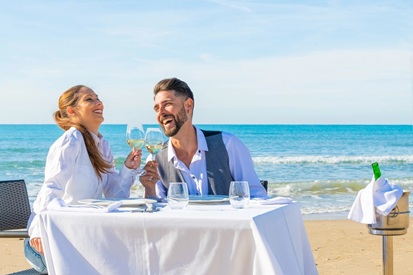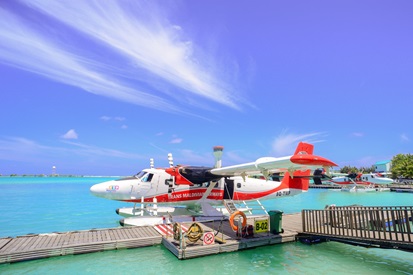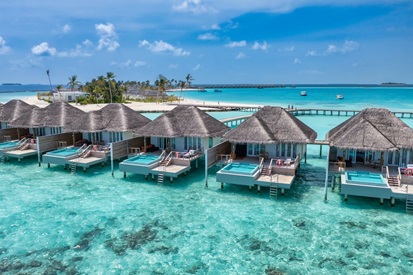

When going on a trip to a new country , it is worth studying all possible nuances in advance. This also applies to potential risks that you may encounter in the Maldives. Of course, the probability of their occurrence is low, but being informed means being prepared. What points should be taken into account before the trip? Let's take a closer look.
Most of the potential risks in the Maldives are related to natural factors. Among them:
- The underwater world attracts thousands of tourists from all over the world .
- Intense sun that can ruin your holiday if you don't take precautions.
- Unpredictable currents, especially dangerous for inexperienced swimmers and divers .
- Coconut palms, the fruits of which can pose a danger if they fall from a height.
Let's consider all these factors in more detail.

Depositphotos
Underwater dangers
The beauty of the Maldivian reefs is mesmerizing, but it is important to remember that among the underwater inhabitants there are both harmless and potentially dangerous species. To avoid unpleasant situations, it is better to study the local marine fauna in advance.
What to pay attention to :
- Corals : Their sharp edges can cause painful cuts that take a long time to heal and can lead to infections .
- Sea urchins : Their fragile spines break easily and can become embedded in the skin.
- Poisonous fish . Lionfish and stonefish are capable of releasing poison that causes severe pain and even paralysis.
- Trigger fish . During the spawning period they become aggressive and can bite.
- Moray eels and stingrays . These creatures usually do not attack first, but can defend themselves if disturbed.
- Sharks . Mostly reef and coral sharks are encountered, they do not pose a threat to humans unless provoked.
Precautions :
- Do not touch marine life with your hands.
- Keep your distance from unfamiliar species.
- Use safety shoes.
- Avoid night snorkeling without an instructor.

Depositphotos
Solar activity
The Maldives is located close to the equator, so the sun is especially strong here. Without proper protection, you can get a serious sunburn in a matter of minutes. Be sure to use sunscreen with a high SPF, wear a hat , swim in long sleeves and drink enough water.
Recommendations:
- Wear a hat and always carry water with you.
- During the first days of your vacation , wear long sleeves, including when snorkeling.
- Avoid exposure to direct sunlight for more than 20 minutes.
- Use sunscreen on all areas of your body, including your ears and ankles. Using sunscreens with certain chemicals (oxybenzone, octinoxate) poses a threat to corals . It is better to use reef-safe creams that do not harm the marine ecosystem .
- If you cannot avoid sunburn, use special products such as panthenol.

Depositphotos
Dangers on Land
There are no dangerous wild animals or poisonous snakes in the Maldives, but there are other factors to consider:
- Insects . Mosquito bites can cause an allergic reaction, so it is worth stocking up on repellents and antihistamines. On resort islands , mosquito control is carried out, while on local islands, the likelihood of encountering these insects is much higher.
- Falling Coconuts : Resorts carefully monitor the ripening of coconuts and pluck them promptly to avoid injury to guests, but in the wild, travelers should exercise moderate caution .

Depositphotos
Currents and ocean waves
Ocean currents in the Maldives are influenced by the monsoons and tides. Within the lagoon, the current is usually calm, but at the edge of the reef, where the azure waters merge into the saturated depths of the ocean, it becomes noticeably stronger.
How to avoid danger :
- Do not swim alone, especially in unfamiliar places.
- Communicate your plans if you plan to explore the outer side of the reef while snorkeling.
- If you find yourself in a current, do not try to swim against it - move across it to the nearest land.
- Listen up to instructions from experienced guides.

Depositphotos
Additional risks
- Infections . Before traveling, check that you have the necessary vaccinations .
- Theft : Crime in the Maldives is minimal, but you should still not leave valuables unattended.
- Water sports . Jet skiing , surfing, wakeboarding are popular pastimes, but they require attention. It is better to use the services of licensed instructors, observe safety precautions and wear protective equipment .
- Fines . Strict laws apply in a Muslim country. Alcohol is prohibited on local islands , and there are serious restrictions on the import of alcohol. In addition, tourists often forget that the export of corals, shells and especially turtle shells from the country is prohibited by law. For violation, a fine may be issued or purchases may be confiscated . If you want to bring something as a keepsake, it is better to buy souvenirs in official stores and bring them through customs with an official receipt .

Depositphotos
By following these simple recommendations and observing basic precautions , you can minimize any risks and enjoy a wonderful holiday in the Maldives!
More articles
- 17 Temples in Bali You Must See
- Hot Springs in Bali: Which and Where to Visit
- Indonesia's Natural Attractions: 18 Places Worth Seeing
- Meru Betiri National Park in Indonesia
- The Most Interesting Routes in Bali: 12 of the Best
- Mauritius in Winter: Weather and Top Attractions
- Samosir Island in Sumatra: All About Vacationing
- The Maluku Islands in Indonesia: All About Vacations
- 10 Unique Facts About Indonesia
- Karimunjawa Island and National Park in Indonesia



